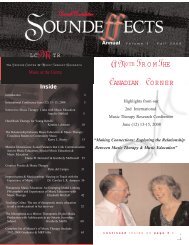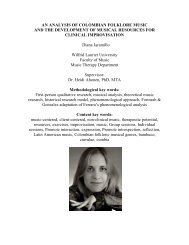Newsletter - Manfred and Penny Conrad Institute for Music Therapy ...
Newsletter - Manfred and Penny Conrad Institute for Music Therapy ...
Newsletter - Manfred and Penny Conrad Institute for Music Therapy ...
- No tags were found...
Create successful ePaper yourself
Turn your PDF publications into a flip-book with our unique Google optimized e-Paper software.
Over the next three years, as my morning walks got longer <strong>and</strong> longer <strong>and</strong> I took inmore of my community’s l<strong>and</strong>scape <strong>and</strong> nuances, the proposal <strong>for</strong> the research centrealso got longer, more complex, <strong>and</strong> indeed more interesting.D r. Charles MorrisonTheCanadianCornerbyLaurel Young (LCMTR)1. For the readers of our newsletter who may not know who you are,how would you describe yourself <strong>and</strong> your role in the development of music therapyin Canada?This year I am celebrating my 50th year as an advocate <strong>for</strong> the music therapy profession.As a past President of the Canadian Association <strong>for</strong> <strong>Music</strong> <strong>Therapy</strong> (CAMT),author <strong>and</strong> editor of several publications, fundraiser <strong>and</strong> clinician, my ef<strong>for</strong>ts havealways been directed toward raising the profile of music therapy in Canada. In 1995 Ibecame the Chair of the Canadian <strong>Music</strong> <strong>Therapy</strong> Trust Fund (CMTTF) <strong>and</strong> with thehelp of the Canadian <strong>Music</strong> Industry we have financially supported over 290 projectsfrom coast to coast. These range from hospice <strong>for</strong> those in need of palliative care, centre<strong>for</strong> the elderly, schools/treatment centre <strong>for</strong> children with special needs as well aswork with street kids, women in prison <strong>and</strong> persons who have experienced trauma.The CMMTF is celebrating its 10th Anniversary this year with several special initiatives<strong>and</strong> events, which will further raise the profile of the profession <strong>and</strong> increase publicawareness in terms of how music therapy can make a difference.2. In what ways do you feel that music therapy research is important tothe development of the profession in Canada?From my first years in the field until now I have seen many changes -- from workingin isolation to seeing a profession, which numbers over 400 persons -- 5 (soon to be 6)undergraduate courses <strong>for</strong> music therapy - A Masters Program, a music therapy centre,a centre <strong>for</strong> research <strong>and</strong> a trust fund which raises monies to support various musictherapy endeavors throughout this country. High quality research is one way in whichwe can keep our momentum moving <strong>for</strong>ward as well as demonstrate the value of thework.3. Do you think that Canadian music therapy researchers can contributeto the profession on an international level? If so, how?As local chair <strong>for</strong> the first North American Joint Conference in Toronto in 1993 <strong>and</strong>person responsible <strong>for</strong> creating the tapestries <strong>for</strong> the succeeding 1996 Joint Conferencein the USA, I strove to project our Canadian identity as a creative, energetic <strong>for</strong>ce, ableto take our place within the international community. I believe that music therapyresearchers who conduct academic <strong>and</strong> practical inquires that also reflect our uniqueCanadian identity <strong>and</strong> values will make the most important contributions.In this issue, apart from news, view <strong>and</strong> events, there are also articleswritten by Dr. Kimmo Lehtonen, Dr. Colin Andrew Lee, <strong>and</strong> Dr.Carolyn Arnason. The Soundeffects welcomes articles by any LCMTRmember. The newsletter is a place to share your research passion oryour research journey. Preparing an article <strong>for</strong> Soundeffects can be ahelpful step towards developing a longer, more academic journal submission.If you have an idea or a potential article please contact meat hahonen@wlu.ca. In the future we want to increase our effectiveness,our influence, <strong>and</strong> publish more statements <strong>and</strong> elaborations ofthe work we are all doing. So we need your help in this endeavor,<strong>and</strong> look <strong>for</strong>ward to receiving contributions connected with music therapyresearch in its many aspects <strong>and</strong> applications from all over theworld. Also, if you have not already done so, we invite you to joinLCMTR <strong>and</strong> announcement lists, details of which can be found on theLCMTR website.Dr. Heidi Ahonen-Eerikainen,MTA, Psychotherapist, Group AnalystAssociate Professor of <strong>Music</strong> <strong>Therapy</strong>Director of Laurier Centre <strong>for</strong> <strong>Music</strong> <strong>Therapy</strong> Research (LCMTR)t4. What kinds of research do you think are most important<strong>and</strong>/or will have the most impact on the profession?In promoting music therapy to other professionals, I have had to justify ourexistence time <strong>and</strong> again. Research projects that are relevant to frontlinemusic therapy practice are very important. One of the best ways to “prove”that music therapy is effective is by doing strong clinical work <strong>and</strong> researchthat supports this idea is a worthwhile endeavor.5. You have been a pioneer in the development of several successfulmusic therapy professional initiatives over the years. Do youhave any “words of wisdom” <strong>for</strong> the LCMTR?In 2001, the Canadian <strong>Music</strong> <strong>Therapy</strong> Trust Fund opened The <strong>Music</strong><strong>Therapy</strong> Centre, the first freest<strong>and</strong>ing clinic/office of its kind in Canada. TheLCMTR has a similar opportunity to make unique <strong>and</strong> important contributionsto the field. It will be essential to create a centre that demonstrates a clearlydefined vision supported by partnerships that reflect both Canadian <strong>and</strong>International perspectives.ic therapy community are welcome.Contact managing board members by e-mail or call(519) 884-1970 ext. 2658/ext. 2431.Editor:Heidi Ahonen-Eerik inenAssistant Editor: Sunil KuruvillaLayout:Dawn www.wlu.caWharnsby33






